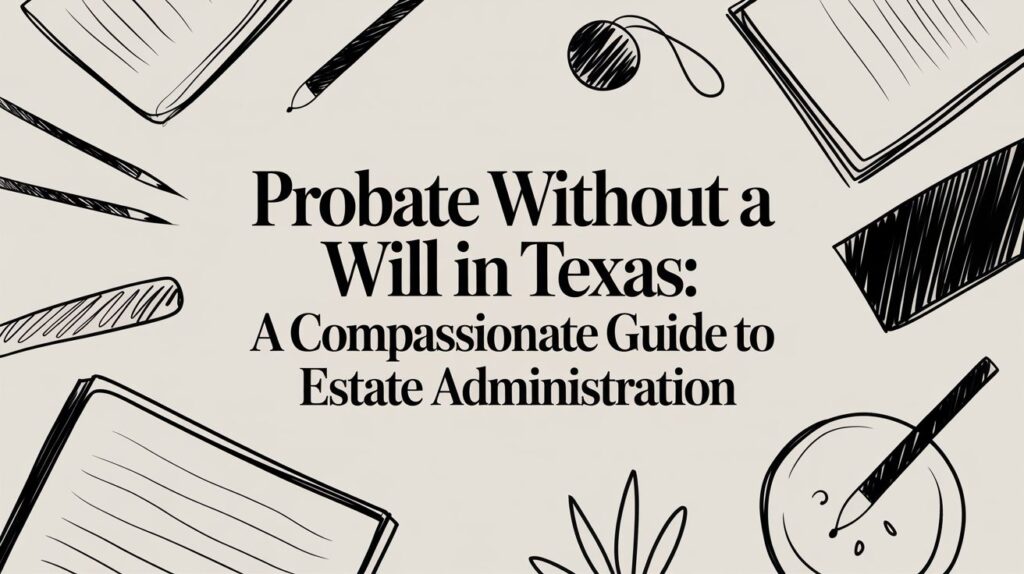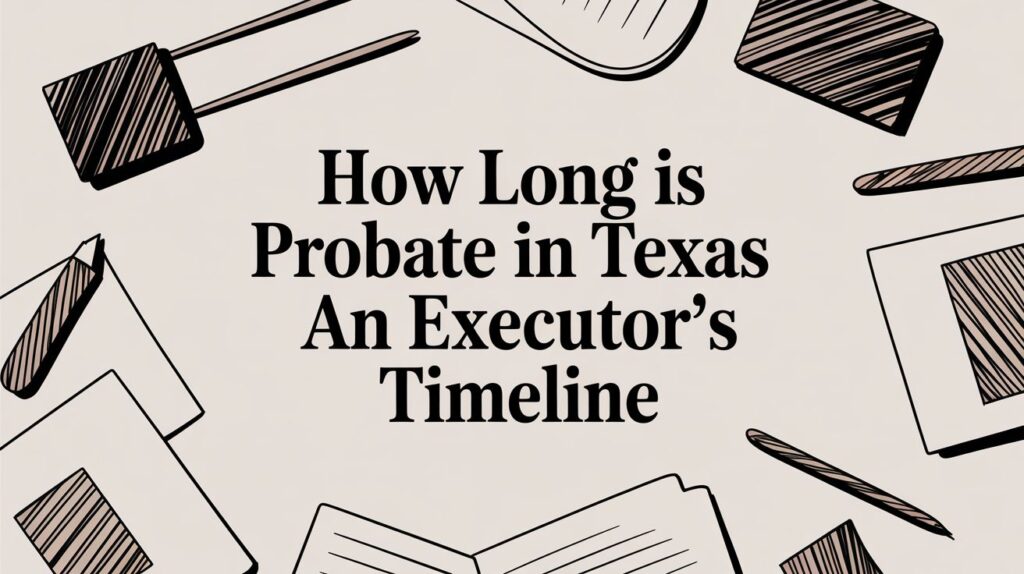If you’re wondering, “is there a statutory limit for probate in Texas?” you’re not alone. It’s one of the most commonly asked questions by heirs, executors, and beneficiaries trying to settle a loved one’s estate. And the short answer is—yes, there is a statutory limit. But, like many things in Texas probate law, the long answer is more nuanced and full of exceptions, caveats, and courtroom stories.
In this deep dive, we’ll unpack exactly what the statutory probate limit is in Texas, what happens if you miss it, and what options still exist after the deadline has passed. We’ll explore real-life examples, the impact of the four-year rule, and how understanding this legal boundary can save families from financial disaster and legal confusion.
Let’s start at the heart of the matter: the infamous four-year rule.

What Is the Statutory Limit for Probate in Texas?
The key statutory limit for probate in Texas revolves around a specific timeline—you must initiate probate proceedings within four years of the decedent’s date of death. This is not just a guideline. It’s law.
The Texas Estates Code §256.003 sets the standard: a will must be filed for probate within four years after the death of the testator (the person who made the will). If not, the will can only be admitted as a muniment of title—and only if the applicant was not “in default.”
Now, let’s break that down with a bit of storytelling.
Real-Life Story: When Four Years Was One Day Too Late
Imagine this. James passed away in Dallas County in 2018, leaving behind a valid will that named his niece, Carla, as the sole beneficiary. Carla had the will in her possession but never filed it because she thought everything was already “handled.” In 2023—five years later—Carla decided to sell James’s house. That’s when the title company asked, “Where’s the probate?”
Carla tried to file the will, but the court denied it. Why? She missed the four-year statutory deadline. Because she waited too long, she could only file it as a muniment of title—and had to prove she wasn’t “in default.” Even then, some banks and insurers refused to recognize her authority.
That one-year delay cost her months in court and thousands in attorney’s fees—all because she didn’t understand that yes, there is a statutory limit for probate in Texas.
Why Does Texas Have a Four-Year Rule?
The probate system is designed to provide finality and structure. Without a deadline, wills could resurface decades later, long after property has changed hands or taxes have been settled. Texas, like many states, uses the four-year rule to encourage timely resolution of estates and to protect creditors, heirs, and purchasers of estate assets.
But the rule isn’t as rigid as it sounds. The key phrase in the statute—“unless the applicant was not in default”—opens the door to late probate filings in some circumstances.
What Does “Not in Default” Really Mean?
In Texas probate, being “not in default” means you had a legitimate reason for failing to file the will within the four-year deadline. This is where things get interesting—and where a good probate attorney becomes invaluable.
Courts have interpreted “not in default” to mean that the person applying for probate didn’t intentionally or negligently delay filing. Some common reasons considered valid include:
- The applicant didn’t know about the will
- The applicant didn’t know the four-year rule existed
- The applicant believed someone else had already filed the will
- Fraud or misrepresentation kept the applicant in the dark

If the court believes your reason is legitimate, they may still allow you to probate the will—even if four years have passed. But it’s not guaranteed. The burden is on you to prove you weren’t negligent or acting in bad faith.
Exceptions to the Probate Deadline in Texas
While the four-year limit seems firm, Texas law offers some flexibility depending on the type of probate process used. Here’s how that plays out.
Probate as a Muniment of Title
If you miss the four-year window, you may still be able to file the will as a muniment of title. This simplified probate process is used when there are no debts other than those secured by real estate. It allows the court to treat the will like a deed—authorizing the transfer of assets without appointing an executor.
But again, to use this route after four years, you’ll need to prove that you weren’t in default.
Intestate Succession Takes Over
If the will can’t be probated—either because it’s too late or the court finds you were in default—Texas intestate succession rules kick in. That means the estate is distributed as if there was no will at all.
This can lead to unexpected outcomes. For example, if someone intended to leave everything to their spouse but didn’t probate the will on time, that spouse might now have to share the estate with stepchildren or other relatives.
Understanding that there is a statutory limit for probate in Texas isn’t just about timelines—it’s about ensuring that your loved one’s wishes are honored.
The Clock Is Ticking: When Does the Four-Year Period Start?
Here’s where people often get tripped up. The four-year period doesn’t start when you find the will, or when you discover you need to probate. It starts on the date of death. That means even if you uncover a will years later, the court will still count from the moment the decedent passed—not when you took action.
That’s why even if the estate is relatively simple, or if the heirs are all getting along, you should not delay. Courts have little sympathy for people who simply “didn’t get around to it.” Time passes quickly, and by the time you realize you’ve missed the deadline, your legal options may be limited. The key takeaway? Procrastination, even if unintentional, can lead to irreversible consequences in probate court.
What Happens If You Miss the Statutory Limit for Probate in Texas?
The consequences of missing the four-year limit can be severe:
- The will may be invalidated
- Heirs may inherit under intestacy laws instead of what the will says
- Property may become harder to transfer
- You may lose your chance to serve as executor
- Title issues may arise when sellingreal estate

Let’s revisit Carla’s story. Because she missed the statutory probate deadline, she had to jump through legal hoops to get the home transferred. It delayed the sale and required an affidavit of heirship, extra title insurance coverage, and approval from her cousins who never expected to inherit anything. It was messy, emotional, and expensive—all because she didn’t know that there is a statutory limit for probate in Texas.
Can You Probate an Estate After Four Years Without a Will?
Yes. When someone dies without a will, the estate goes through intestate probate. There’s no statutory limit like the four-year rule for wills, but delays can still cause complications—especially when it comes to locating heirs, dealing with taxes, and preserving evidence of ownership.
So, even if there’s no will involved, don’t delay probate. The longer you wait, the harder it becomes to gather documents, value property, and identify rightful heirs.
How to Avoid Missing the Probate Deadline
If you’re reading this article before someone has passed—or if you’re helping someone plan their estate—you’re already ahead of the curve. Here are some tips to avoid the pitfalls of probate delays:
- Encourage prompt filing of the will: The earlier probate is initiated, the fewer complications arise.
- Store wills in a known, secure location: Avoid the tragedy of a “lost will.”
- Educate family members about the four-year rule.
- Consult a probate attorney within weeks of death, not months or years.
Understanding that there is a statutory limit for probate in Texas is just the beginning. Acting on that knowledge can prevent costly mistakes and family disputes.
How a Probate Attorney Can Help You Navigate the Four-Year Rule
When it comes to beating the statutory clock, timing is everything. A probate attorney can help by:
- Determining whether the four-year limit has passed
- Filing timely applications for probate
- Advising whether a muniment of title or intestate administration is appropriate
- Preparing supporting affidavits to show you were “not in default”
- Resolving disputes among heirs or beneficiaries

Even if you’re approaching the four-year deadline—or have already passed it—a skilled probate attorney may still be able to help you preserve your rights and carry out your loved one’s final wishes.
Final Thoughts: Why Timing in Texas Probate Matters
So, is there a statutory limit for probate in Texas? Yes—and it’s more important than most people realize. The four-year rule can make or break an estate administration, change who inherits, and create lasting legal headaches if ignored.
But if you act early, stay informed, and work with the right legal guidance, you can avoid these pitfalls. Whether you’re an executor trying to do things right or a family member who’s just discovered an old will, don’t wait.
The four-year clock is ticking—and your actions today could make all the difference tomorrow.








